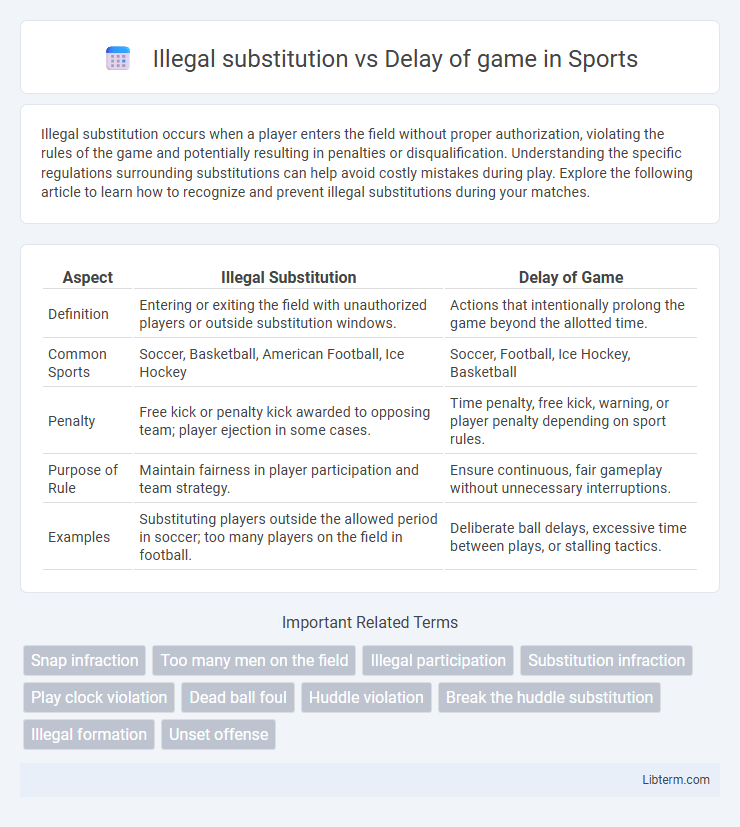Illegal substitution occurs when a player enters the field without proper authorization, violating the rules of the game and potentially resulting in penalties or disqualification. Understanding the specific regulations surrounding substitutions can help avoid costly mistakes during play. Explore the following article to learn how to recognize and prevent illegal substitutions during your matches.
Table of Comparison
| Aspect | Illegal Substitution | Delay of Game |
|---|---|---|
| Definition | Entering or exiting the field with unauthorized players or outside substitution windows. | Actions that intentionally prolong the game beyond the allotted time. |
| Common Sports | Soccer, Basketball, American Football, Ice Hockey | Soccer, Football, Ice Hockey, Basketball |
| Penalty | Free kick or penalty kick awarded to opposing team; player ejection in some cases. | Time penalty, free kick, warning, or player penalty depending on sport rules. |
| Purpose of Rule | Maintain fairness in player participation and team strategy. | Ensure continuous, fair gameplay without unnecessary interruptions. |
| Examples | Substituting players outside the allowed period in soccer; too many players on the field in football. | Deliberate ball delays, excessive time between plays, or stalling tactics. |
Introduction to Illegal Substitution and Delay of Game
Illegal substitution occurs when a player enters the field without proper authorization or timing, violating team roster regulations during gameplay. Delay of game is committed by a team that intentionally prolongs play, such as failing to resume action within the allotted time or obstructing opponent's restarts. Both infractions disrupt the flow of the game and result in penalties to maintain the sport's integrity and fairness.
Definitions: What is Illegal Substitution?
Illegal substitution occurs when a player enters the game without following proper protocols, such as not receiving referee approval or substituting beyond the allowed number per period. It violates official game rules by disrupting the flow and fairness of play. Delay of game, by contrast, involves deliberate actions that slow down the match, like holding the ball too long or preventing timely restarts.
Understanding Delay of Game in Sports
Delay of game in sports occurs when a player or team intentionally slows down the pace to gain an unfair advantage, often resulting in a penalty. Unlike illegal substitution, which involves unauthorized player changes during active play, delay of game emphasizes timing misconduct such as holding the ball too long or not resuming play promptly. Recognizing delay of game penalties is crucial for maintaining fairness, as referees enforce strict time limits to keep the game fluid and competitive.
Key Differences Between Illegal Substitution and Delay of Game
Illegal substitution occurs when a player enters the game without proper authorization, violating substitution rules and resulting in penalties such as free throws or loss of possession. Delay of game involves actions that intentionally halt or slow the game's progress, like preventing the ball from being inbounded promptly, leading to warnings or technical fouls. The key difference lies in illegal substitution being a player personnel violation, whereas delay of game pertains to time management and game flow infractions.
Common Scenarios for Illegal Substitution
Common scenarios for illegal substitution include entering the game without the referee's permission, substituting too many players at once, or failing to report substitutions properly. This violation often occurs during dead-ball situations or quick transition periods when teams attempt to gain a tactical advantage. Illegal substitutions disrupt game flow and result in penalties such as loss of possession or yardage, distinguishing them clearly from delay of game infractions which involve time violations.
Typical Situations Leading to Delay of Game
Typical situations leading to delay of game include a quarterback taking too long to snap the ball in football, players failing to promptly enter or exit the field during substitutions, and teams exceeding the allotted time for free throws in basketball. Illegal substitution occurs when a player enters the game without proper acknowledgment by officials or during play stoppages, often causing confusion or penalties. Both infractions disrupt game flow but are distinguished by timing and procedural context in sports like football, basketball, and hockey.
Penalties for Illegal Substitution: Rules and Consequences
Illegal substitution in football results in a penalty involving a free kick or a throw-in awarded to the opposing team, often accompanied by a caution to the offending player or team official according to FIFA Laws of the Game. This penalty ensures teams maintain fair play by restricting the unauthorized entry or exit of players during the match. Delay of game penalties usually involve a minor time infraction resulting in a free kick without additional disciplinary measures, highlighting the stricter consequences tied to illegal substitutions.
Delay of Game Penalties: Enforcement and Impact
Delay of game penalties in football occur when the offense fails to snap the ball before the play clock expires, resulting in a five-yard penalty and loss of down in certain situations. Enforcement involves the official signaling the penalty and the team being required to either run the play or accept the yardage loss, significantly disrupting offensive rhythm and game momentum. This penalty impacts game strategy by forcing quicker decisions and can shift field position dramatically, influencing both team tactics and scoring opportunities.
Preventing Illegal Substitution and Delay of Game Infractions
Preventing illegal substitution and delay of game infractions requires strict adherence to substitution protocols and game timing rules. Coaches and players must ensure substitutions occur only during designated stoppages and communicate clearly with officials to avoid penalties. Effective game management and awareness of game clocks minimize disruptions and maintain the flow of play.
Conclusion: Importance of Compliance with Game Timing and Substitution Rules
Strict adherence to game timing and substitution rules ensures fair play and maintains the integrity of competitive sports. Illegal substitution disrupts team strategy and can lead to penalties that adversely affect game outcomes, while delays of game undermine the flow and pace essential for a dynamic sporting experience. Compliance with these regulations is crucial for upholding sportsmanship and ensuring consistent enforcement across all levels of competition.
Illegal substitution Infographic

 libterm.com
libterm.com